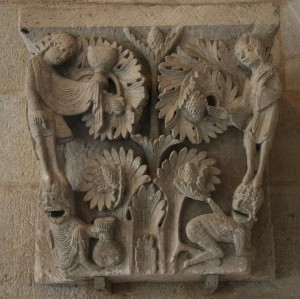
This coming Sunday (August 30) and the week following, Roman Catholics and Episcopalians (Anglicans) once again will be praying the same prayer at the Eucharist and at their Daily Offices.
This is the Roman Catholic version of the prayer:
Almighty God,
every good thing comes from you.
Fill our hearts with love for you,
increase our faith,
and by your constant care
protect the good you have given us.
This is the Episcopalian version of the prayer:
Lord of all power and might,
the author and giver of all good things:
Graft in our hearts the love of your Name;
increase in us true religion;
nourish us with all goodness;
and bring forth in us the fruit of good works;
through Jesus Christ our Lord,
who lives and reigns with you and the Holy Spirit,
one God for ever and ever. Amen.
Both are translations of
Deus virtútum, cujus est totum quod est optimum : ínsere péctóribus nostris amórem tui nóminis, et præsta in nobis religiónis augméntum ; ut, quæ sunt bona, nutrias, ac pietátis studio, quæ sunt nutrita, custódias. Per Dóminum.
There is more about this prayer’s history and a reflection on it in the weekly reflection on the collect/opening prayer on this site.
Let us widen the circle that prays this prayer together this coming weekend and week.
As well as shared feasts (eg. of Epiphany, Palm Sunday, Christ the King), I have discovered other days (and the week following) that Anglicans and Catholics pray the same prayer:
October 26
October 12
October 5
No one has yet been able to come up with an authoritative explanation of how and why Roman Catholics and Episcopalians (Anglicans) are praying the same collects/opening prayers from time to time with a lectionary system that is now shared but is based on a significantly different way of organising the year to the inherited Western system. In my opinion either Episcopalians are drawing from post-Vatican II collect developments (there is no record of this that I am aware of), or both are drawing from an earlier source and system that I cannot get my head around. Whatever it is – it is cool that these prayers are shared and on the same day (week)!
Others are using different collects/opening prayers for this Sunday:
22nd Sunday in Ordinary Time August 30 from the collect/opening prayer (NZPB)
12th Sunday after Trinity August 30 from the collect/opening prayer (CofE Common Worship)
Image:
One of the capitals in the Cathedral of St. Lazarus in Burgundy, France, depicts a triumphant image of (left) Charity defeating Greed and (right) Patience conquering Wrath.Jesus dares to correct the Pharisees. His explanation of the commandments presents the audience with stricter guidelines for communal living. Though he does not use these terms, Jesus wants the Pharisees and the disciples to start thinking about vices and virtues. These vices and virtues, everyday emotions and actions, are what the commandments are concerned with because they are what can foster or breakdown communities.
Capital: Virtues and Vices, from Art in the Christian Tradition, a project of the Vanderbilt Divinity Library, Nashville, TN. http://diglib.library.vanderbilt.edu/act-imagelink.pl?RC=54155 [retrieved August 26, 2009].




Like I said to you Father on Twitter… Could this be a Twitter effect after all we do mingle with thought process interchange and breaking down a lot of useless barriers that keep people apart.
Father,
As my dear Roman mother in law said during Eucharist while visiting our Episcopal church in Madison, WI., several years ago, “This was all fine until I realized that you people stole the Mass from us!”. She was certain from that day forward that I was neither Irish enough, nor Catholic enough to be married to her son. After her death, my husband and I found out that we are actually third cousins, and I am indeed both Irish & Catholic.
My story could be a parable.
It is possible that the Roman church and the Anglican church, in fact, are third cousins. My Roman Catholic priest, and my Anglican baptismal priest (now a Bishop) both count me as a member of their flock.
One difference though, my Anglican family allows me to take the host in the form of a non-wheat wafer. The Pope does not allow Celiac disease patients to take the host, as he will not allow a non-wheat wafer.
Anyway, Politics split the church, faith will be the only way to repair it.
With Respect, IHS
Mary Alice
Bosco, FWIW, I like the Episcopal Church version of the prayer better. Of course, I may be prejudiced. I’m sure that God likes both versions.